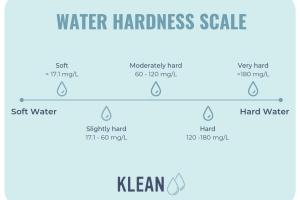Discovering Hard Water: Comprehensive Guide to Identifying Hard Water in Your Home

-
Quick Links:
- Understanding Hard Water
- Signs You Have Hard Water
- How to Test for Hard Water
- Causes of Hard Water
- Effects of Hard Water
- Solutions for Hard Water
- Case Studies and Real-World Examples
- Expert Insights
- FAQs
Understanding Hard Water
Hard water is a common problem in many households, characterized by high mineral content, particularly calcium and magnesium. These minerals can come from various sources, primarily groundwater. When water travels through limestone and chalk, it picks up these minerals, leading to hardness.
What Makes Water Hard?
Water hardness is mainly caused by the presence of dissolved calcium and magnesium ions. The concentration of these minerals can vary greatly from one geographical area to another.
Signs You Have Hard Water
Identifying hard water is essential for maintaining your home's plumbing and enhancing your quality of life. Here are some common signs:
- Soap Scum: If you notice a filmy residue left on your dishes after washing, this is a sign of hard water.
- Stiff Laundry: Clothes that feel rough or look dingy after washing may indicate hard water.
- Scale Buildup: White, chalky deposits on faucets and showerheads are telltale signs of hard water.
- Dry Skin and Hair: If your skin feels itchy and your hair is dull, hard water may be the culprit.
- Frequent Appliance Repairs: Increased corrosion in your appliances, especially dishwashers and water heaters, can indicate hard water issues.
How to Test for Hard Water
Testing for hard water can be done easily at home or through professional services.
DIY Testing Methods
- Soap Test: Fill a bottle with water and add a few drops of liquid soap. Shake it; if it produces little to no lather, you likely have hard water.
- Test Strips: Purchase hard water test strips from a home improvement store. Dip the strip in water and compare the color change with the provided chart.
Professional Testing
For a more accurate measurement, consider hiring a water testing laboratory that can provide detailed analysis.
Causes of Hard Water
Hard water originates from various natural and human-induced sources:
- Geological Formation: Regions with limestone or chalk formations often have hard water.
- Groundwater Usage: Wells and boreholes can draw hard water from underground sources.
- Urban Development: Increased mineral runoff due to construction can contribute to water hardness.
Effects of Hard Water
Hard water can have several negative effects on your home and health:
- Clogs in pipes and appliances, leading to increased maintenance costs.
- Reduced efficiency of soap and detergents, leading to higher consumption of cleaning products.
- Skin irritation and dryness due to residue left on the skin.
Solutions for Hard Water
Addressing hard water issues can enhance your quality of life:
- Water Softeners: Install a water softener to remove calcium and magnesium ions.
- Descaling Agents: Use chemical descalers in appliances to reduce buildup.
- Regular Maintenance: Schedule regular plumbing checks to prevent issues.
Case Studies and Real-World Examples
Case Study 1: The Smith Family
The Smith family in Ohio struggled with hard water for years. After switching to a water softener, they reported significant improvements in skin health and appliance longevity.
Case Study 2: A Restaurant in Texas
A restaurant in Texas faced frequent dishwasher repairs due to hard water. After testing and treating their water, they reduced maintenance costs by 30%.
Expert Insights
According to water quality experts, addressing hard water can lead to significant savings in household maintenance costs. Regular testing and treatment are essential for maintaining a healthy home.
FAQs
1. What is hard water?
Hard water contains high levels of minerals, primarily calcium and magnesium.
2. How can I tell if my water is hard?
Look for signs like soap scum, stiff laundry, and scale buildup on fixtures.
3. Can hard water cause skin problems?
Yes, hard water can lead to dry skin and irritation.
4. What is the easiest way to test for hard water?
A simple soap test or test strips can effectively determine water hardness.
5. Are there health risks associated with hard water?
Hard water is generally safe to drink, but it can cause skin irritations and affect appliances.
6. Can I soften hard water myself?
Yes, you can install a water softener or use descaling agents.
7. What are the long-term effects of hard water on appliances?
Hard water can lead to clogs and reduced efficiency in appliances, increasing repair costs.
8. How often should I test my water for hardness?
It is advisable to test your water at least once a year.
9. What are some chemical treatments for hard water?
Chemical descalers and water softeners are effective treatments.
10. Where can I find a professional testing service?
Check local listings for water testing labs or consult your municipal water supplier.
For more information, visit these authoritative sources:
Random Reads
- 3 ways to convert vhs tape to dvd
- How to lubricate door hinges
- How to keep your cell phone safe from hackers
- How to look at minecraft screenshots
- How to log out of yahoo mail
- Transform bathroom into sauna
- How to block unknown callers
- How to block unblock sites firefox
- Fix outlook error 0x800ccc0b
- Fix ps4 controller flashing white